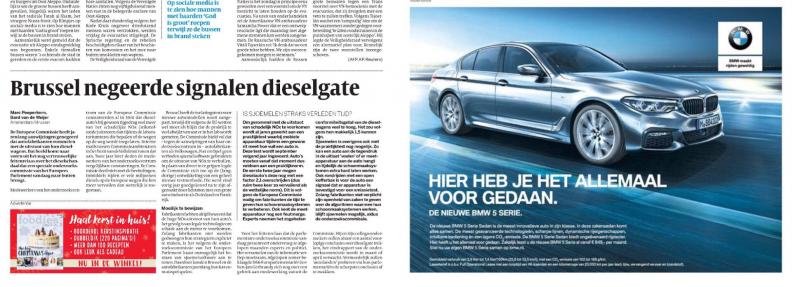
Dieselgate report slams Commission and national governments for maladministration
Earlier this week, the draft report of the EU Parliament’s inquiry into the Dieselgate emissions cheating scandal (EMIS) was published, after nine months of parliamentary hearings. The most important conclusion of the report is that the European Commission and EU member states had known since at least 2004-05 that nitrogen oxide emissions from diesel cars were far above legal limits, but neither took action. As Gerben-Jan Gerbrandy, the MEP who co-wrote the report put it: “Dieselgate would not have happened if our national governments and the European Commission would have acted on their legal and administrative responsibilities.”
The report slams a number of different areas of the emissions’ testing regime. The Commission did not investigate early evidence of car manufacturers cheating on emission tests. Car manufacturers benefited from an excessively industry-friendly emissions testing system, in which they could pay private testing services to advise them on how to successfully pass car emission tests in their own labs. The introduction of stricter emission testing rules was continuously delayed and weakened, the report points out, “also due to choices of political priorities, such as the focus of the Commission and the Member States on avoiding burdens on industry in the aftermath of the 2008 financial crisis.” Meanwhile, member state governments are criticised for failing to ensure that cars comply with the EU’s car emission legislation. All in all, these flaws allowed the car industry to continue with toxic diesel emissions far beyond the legal limits, at the expense of public health.
The chair of the EMIS committee, Kathleen van Brempt, has commented that: “It is clear that Member States have made every possible effort to protect their own car industry, to the detriment of the health of their own citizens.” Gerbrandy, the co-author of the report goes even further in accusing member states: "There seems to be a blind trust in the good intentions of car manufacturers, especially when it has production plants in the country. But it is even more disturbing that even after the Dieselgate scandal actually very little has changed.”
The report also highlights the excessive political influence of the car industry and its lobbyists. More than half of the participants in meetings of the EU advisory group on the new test procedure for emissions from cars while driving – the so-called RDE-LDV expert group – worked for the car lobby. This violates the Commission’s own rules for advisory groups. The report also expresses concern about the Commission’s failure to “take meaningful and complete minutes” of the meetings of the advisory group, which hampered the work of the parliamentary inquiry.
This industry-dominated advisory group is indicative of the far too intimate relations between EU decision-makers and the car industry. Since the Dieselgate scandal broke in Autumn 2015, CEO has published a series of articles exposing scandalous examples of this problem. In 2012, for instance, the Commission’s Enterprise and Industry department delayed the enforcement of diesel emission law in a bid to help the car industry. In the following years, car industry lobbying created numerous loopholes in the new Real-Driving Emissions test procedure.
MEP Gerbrandy told the Dutch newspaper NRC that he would have liked the report’s conclusions to be even stronger when it comes to the role of the European Commission and its failure to act against emissions cheating. Gerbrandy reveals that Christian Democratic MEPs opposed this as they wanted to protect MEP Antonio Tajani who is their candidate to become President of the European Parliament in the new year. Between 2010 and 2014, Tajani was European Commissioner for Industry. Gerbrandy heavily criticises Tajani’s role in Dieselgate, referring to a letter to Tajani from a minister of environment who expressed deep concerns about extreme levels of air pollution from diesel cars: “Tajani did nothing with it. He even wanted a stop on new rules for the automobile industry because of the crisis. That is gross negligence and mismanagement. Anyway, his name is not mentioned in the report”, Gerbrandy said.
The next steps in the Parliament’s inquiry into Dieselgate will be to amend and vote on the draft report in late February in the EMIS committee, with the Parliament‘s plenary due to adopt the amended report in April.
One burning question that remains is whether the report’s damning conclusions will have political consequences for the Commission, ex-Commissioner Tajani and member state governments. And will the final round of debates about lessons from Dieselgate finally lead to a break-up of ‘Europe’s automotive-political complex’: the far too cosy relations between car industry lobbyists and decision-makers, both in Brussels and in key member states?
